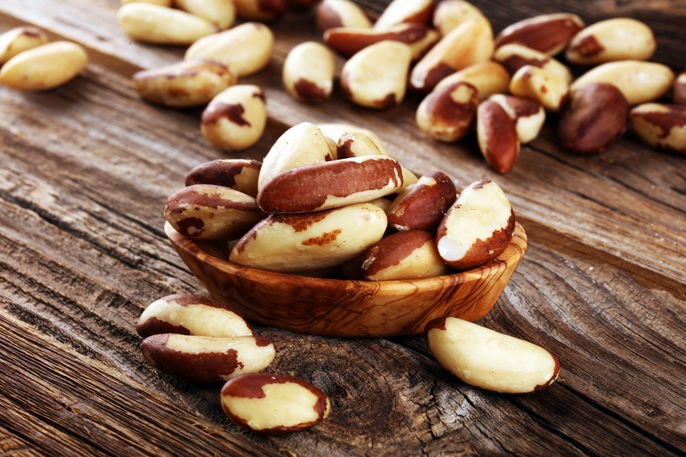Brazil nut benefits are derived from their high concentration of proteins, fiber, selenium, magnesium, phosphorus, zinc and complex vitamins. B and vitamin E. They are a nut from the oilseed family, just like almonds and walnuts,
Because they are rich in antioxidants, Brazil nuts also reduce total cholesterol, improve the immune system and help prevent some types of cancer, such as breast, prostate and colon.
Brazil nuts are the fruit of a tree called Bertholletia excelsa that grows mainly in South America. They can be purchased in supermarkets, fairs and natural product stores.

Health benefits
Brazil nuts have several health benefits such as:
1. Promoting heart health
Brazil nuts are rich in antioxidants and other components such as selenium and vitamin E. These help to reduce LDL cholesterol, also known as bad cholesterol, and, consequently, reduce the risk for cardiac diseases such as atherosclerosis and heart attack.
Furthermore, these nuts contains magnesium, fiber and good fats like omega-3, which also help to reduce LDL cholesterol and increase good cholesterol, HDL. Brazil nuts also have arginine and resveratrol, which are substances that improve circulation and can prevent blood clots.
2. Preventing cancer
Due to their high levels of selenium, vitamin E and flavonoids, Brazil nuts help prevent some types of cancer, especially lung, breast, prostate and colon cancer. These compounds have a high antioxidant power that not only prevents damage caused by free radicals to cells, but also increases the body's defenses to boost immunity.
3. Maintaining brain health
Brazil nuts are rich in selenium and vitamin E, nutrients with anti-inflammatory and antioxidant properties that help improve cognitive function and prevent diseases such as Alzheimer's, Parkinson's and senile dementia.
Furthermore, consuming this nut also helps to improve mood, as depression can be associated with low levels of zinc and selenium.
4. Keeping hair and nails healthy
Because they are rich in selenium, zinc, vitamin B, omega-3 and vitamin E, regular consumption of Brazil nuts can contribute to the health of hair, skin and nails. These nutrients are essential for strengthening hair and preventing hair loss, and can also improve skin healing, prevent premature aging and the formation of wrinkles. They can also strengthen the nails.
5. Reducing high blood pressure
Brazil nuts are rich in arginine, magnesium, potassium and antioxidants, which can promote the relaxation of blood vessels- This can promote optimal blood circulation and therefore reduce blood pressure.
6. Strengthening the immune system
Brazil nuts also strengthen the immune system as they contain antioxidants like selenium which help reduce inflammation. This nut is rich in zinc and vitamin E, nutrients that protect the body against infections and prevent illnesses like the cold and flu.
7. Helping to regulate the thyroid
Selenium and zinc are components that are necessary for the synthesis of thyroid hormones. A decrease in these minerals can cause hypothyroidism and other thyroid-related diseases. Although it is not fully proven, the consumption of Brazil nuts can help regulate the thyroid and benefit people who suffer from problems related to this gland.
8. Providing energy
Brazil nuts are rich in healthy fats, mainly polyunsaturated and monounsaturated, which provide energy for the body. Furthermore, it is rich in proteins and potassium, which also promote muscle gains and recovery.
9. Promoting weight loss
Brazil nuts can promote weight loss when they are part of a healthy and balanced diet. They contain selenium, a micronutrient that participates in energy metabolism in the liver, adipose tissue and skeletal muscle. It is also important for thermogenesis, otherwise known as fat burning, which can help to combat obesity and other related metabolic diseases.
10. Promoting muscle gains
In addition to providing energy to the body, Brazil nuts also contain proteins and selenium, both of which promote muscle gains. In addition, it also has potassium, which promotes muscle recovery and prevents cramps during exercise.
Brazil nuts also contain magnesium, a mineral associated with optimal muscle performance, which can boost strength to perform exercises.
Nutritional information
The following table shows the nutritional composition in 100 g of Brazil nuts:
It is important to highlight that to obtain all the benefits mentioned above, Brazil nuts should be incorporated into a healthy and balanced diet.
How to consume
To obtain its benefits, You should consume 1 Brazil nut per day for about 5 days per week. However, it is important not to consume more than 10 g per day, as large quantities of this food can cause problems such as pain, muscle weakness and spots on the fingernails.
Brazil nuts should be stored in a cool place protected from sunlight to protect their properties. They can be consumed raw or together with fruits, smoothies, salads, cereals and desserts.
Brazil nut farofa recipe
Ingredients
- 2 tablespoons of butter
- 2 tablespoons of chopped onion
- 2 cloves of crushed garlic
- 60 g of crushed Brazil nuts
- 100 g of raw cassava flour
- Salt and black pepper to taste
How to prepare
Sauté the onion and garlic in the butter, and add the chestnuts and cassava flour. Let it braise for about 5 minutes. Season with salt and pepper and leave for another 5 minutes, continuously stirring all the ingredients. Turn off the heat and serve.
Possible side effects
Due to its high selenium content, consuming Brazil nuts in excess, around 50 nuts at a time for example, can cause intoxication. This can present with serious symptoms such as shortness of breath, fever, nausea and problems in some organs, such as the liver, kidneys and heart.
Some people may also be allergic to Brazil nuts, causing symptoms such as redness and itching of the skin and, in more severe cases, shortness of breath, swelling of the mouth, nose and eyes and difficulty breathing.






























